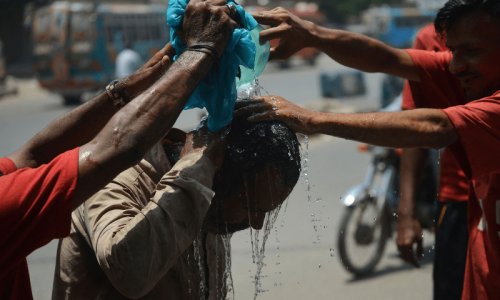With the rise in temperature, the Punjab Primary and Secondary Healthcare Department ordered medical facilities to make standard operating procedures (SOPs) on Sunday.
As a result of some high air pressure, the weather experts had warned earlier this week that a significant heatwave would affect most of the nation.It appears that Sindh and Punjab will be badly hit. It is anticipated that the heatwave would start on May 21 and peak between May 23 and May 27. Extreme heat is expected in Sindh and Punjab from May 21 to May 23. From May 23 to May 27, the temperature will rise considerably further.
Hey there! Therefore, the Punjabi government has chosen to reduce the length of the school year for both public and private institutions. The revised schedule is set for May 18–May 31. Today, the provincial health department sent out clear instructions to the medical superintendents of tertiary care institutions, district headquarter hospitals, tehsil headquarter hospitals, and the chief executive officers of the district health authorities.
The Pakistan Meteorological Department’s advisory on the approaching heatwave was referenced in a health department letter that Dawn.com obtained. This heat wave is expected to badly influence routine life and daily activities of the people, especially in the southern districts of Punjab—Bahawalpur, Rahim Yar Khan, Dera Ghazi Khan, and Multan.
The department had provided SOPs, which included the placement of heatwave counters to educate the public and advice against preventive steps at DHQ, THQ, and tertiary care facilities. It also emphasized the need for coordination meetings with all stakeholders to establish a responsibility matrix for each department.
Officials were instructed to inform the public about avoiding heat, staying hydrated, limiting outdoor activities, and handling emergencies. The directive emphasized ensuring all water coolers are filled with clean water and air conditioners are operational in all health facilities. Additionally, all necessary medicines must be available round the clock.
The health department urged close coordination with district and tehsil administrations, Rescue 1122, and district disaster management authorities for immediate emergency response. Educational messages to the public included advice on limiting outdoor activities, using sun protection, avoiding strenuous work in direct sunlight, drinking plenty of clean water, and using mist fans and air conditioners to maintain a tolerable environment.
Irfan Ali Kathia, the director general of the Punjab Provincial Disaster Management Authority (PDMA), stated that citizens were being informed about heat wave dangers via online and social media platforms. He emphasized the importance of joint efforts by all departments to combat the heatwave and advised citizens to take precautions, avoid unnecessary outdoor activities, and wear light-colored cotton clothing.



